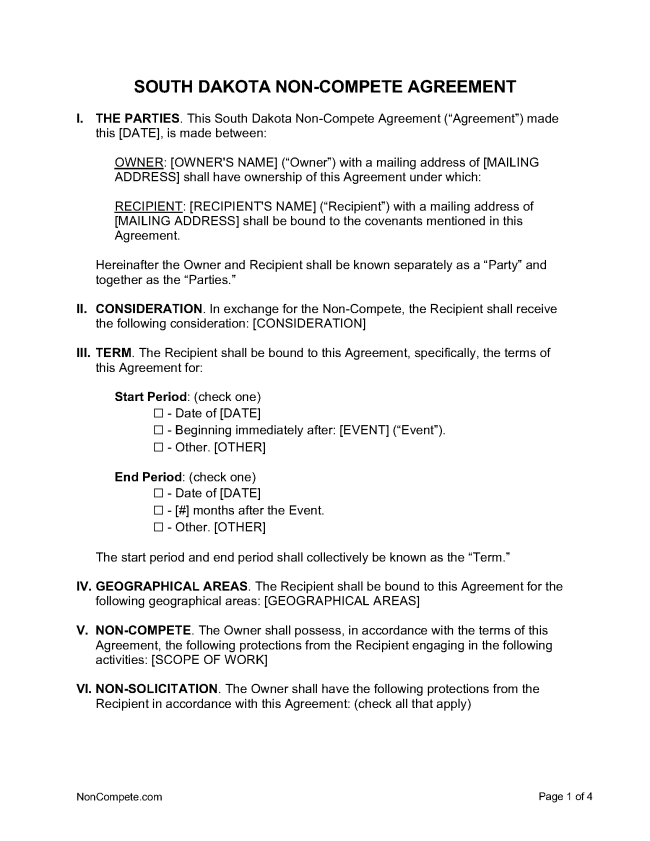A South Dakota non-compete agreement is a contract that restricts a person’s ability to participate in a particular profession, trade, or business within a specific region and timeframe. Non-competes, also called “covenants not to compete,” exist to protect businesses against unfair competition. However, the law treats non-compete agreements with a high degree of scrutiny in order to protect the public’s interest in freedom of trade, allowing them only in narrow situations.
Table of Contents |
Are Non-Competes Enforceable in South Dakota?
South Dakota allows non-compete agreements only under limited circumstances. The law seeks to balance legitimate business interests with the public policy objective of freedom of trade.
The state places strong constraints on contracts that would interfere with the freedom to exercise a lawful profession, trade, or business, generally holding such contracts to be void (§ 53-9-8). Non-compete agreements are considered contracts in restraint of trade and are thus subjected to strict scrutiny as to validity. (Central Monitoring Service v. Zakinski (1996))
Statutory Exceptions
Within a finite territory and timeframe, a covenant not to compete may be enforceable under the following exceptions:
- Upon the sale of a company, the seller may agree to refrain from conducting business in the same scope as a show of goodwill (§ 53-9-9);
- Members of a dissolved partnership may agree not to carry on similar business locally (§ 53-9-10);
- An employment agreement can include a covenant not to compete that restricts the employee from engaging in the same business or profession (§ 53-9-11);
- Insurance agents who are independent contractors working exclusively for one insurance company may agree not to engage in like business or solicit customers (§ 53-9-12).
Prohibited Professions
Contracts that seek to restrict the practice of a healthcare provider are not valid. Healthcare providers are free to provide services for patients or practices regardless of existing employment or partnership contracts. (§ 53-9-11.1)
Attorneys cannot enter into a contract restricting their rights to practice law upon the termination of a professional relationship or as part of a settlement agreement. (§16-18 app. R. 5.6)
Protectable Interests
Non-compete agreements are valid insofar as they serve to protect legitimate business interests. Protectable interests include:
- Customers
- Trade secrets (§ 37-29-1(4))
- Sensitive information, such as price lists and business practices
If a non-compete falls within one of the statutory exceptions above, the contract is presumed to protect legitimate interests. Thus, no further proof of reasonableness is typically required. (American Rim & Brake, Inc. v. Zoellner (1986); Centrol, Inc. v. Morrow (1992))
Terminating an Employee
If an employee is fired through no fault of their own, the courts must balance the reasonability of the employer’s interests with the public interest in allowing the employee to continue in their chosen profession. (Central Monitoring Service v. Zakinski (1996))
Burden of Proof
South Dakota does not put forth specific statutory guidance as to which party in a non-compete dispute has the burden of proof, nor does case law answer this question. However, the party seeking to enforce the non-compete will generally have to demonstrate more evidence in order to overcome the presumption against contracts in restraint of trade—especially in cases involving an employee who was fired.
Continued Employment (Consideration)
Continued employment is adequate consideration to validate a covenant not to compete as contracts in writing can be altered without introducing a new exchange of value. Additional compensation or other changed terms are not required. (American Rim & Brake, Inc. v. Zoellner (1986))
Maximum Term
South Dakota places a maximum time limit of two (2) years on non-compete agreements in connection with employment agreements.
There is no statutory maximum term placed on other contracts of restraint of trade, such as non-compete agreements in connection with the sale of a business. Time period clauses in non-competes must be reasonable under the given circumstances as determined by the courts. Terms of up to three (3) years have been upheld (Ehlers v. Iowa Warehouse Co. (1971)), whereas a ten (10) year term was found to be unreasonable. (1st Am. Sys., Inc. v. Rezatto (1981))
Blue Penciling (allowed)
South Dakota will allow the partial enforcement of otherwise-valid non-compete agreements, a practice known as “blue penciling” to bring contracts into compliance with the statute. (Loescher v. Policky (1969))
